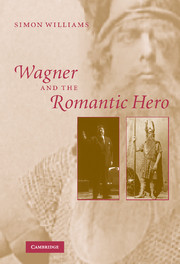Book contents
- Frontmatter
- Contents
- Acknowledgments
- Note on abbreviations of sources
- Introduction
- 1 Modes of heroism in the early nineteenth century
- 2 Wagner and the early nineteenth-century theatre
- 3 Early music-drama: the isolated hero
- 4 Heroism, tragedy, and the Ring
- 5 The last music-dramas: toward the messiah
- 6 Wagner's heroism on stage
- Notes
- Bibliography
- Index
Introduction
Published online by Cambridge University Press: 22 September 2009
- Frontmatter
- Contents
- Acknowledgments
- Note on abbreviations of sources
- Introduction
- 1 Modes of heroism in the early nineteenth century
- 2 Wagner and the early nineteenth-century theatre
- 3 Early music-drama: the isolated hero
- 4 Heroism, tragedy, and the Ring
- 5 The last music-dramas: toward the messiah
- 6 Wagner's heroism on stage
- Notes
- Bibliography
- Index
Summary
Heroism is, at best, a dubious quality. We admire heroes because they embody all that we consider most admirable in ourselves. Heroes are possessed of an excess of human energy, which has a propitious effect on the world around them. They display greater courage than regular people do, they know what they want and are fearless in achieving it. Through their exploits we glimpse, however briefly, images of human perfection and, depending on our beliefs, of something divine. But heroes are not easy to live with. The moment we try to incorporate heroism into our everyday lives, we play down whatever is individual about it and lay stress on its social virtues. Community newspapers encourage readers to nominate as “local heroes” those whose selfless labors are a benefit to the community. We designate as heroes people who help us, set us good examples, and save us from our worst selves. But, as Emerson put it, “the heroic cannot be the common, nor the common the heroic.” The heroic in our mundane world can be positively oppressive, especially when it claims authority over us. Our leaders may conceive of themselves as heroes, but the moment they do so, we find ourselves obliged to deny them. We hem them in with bureaucratic limitations and reduce them to our own size or smaller by insisting that they are models of indecision and inefficiency.
- Type
- Chapter
- Information
- Wagner and the Romantic Hero , pp. 1 - 4Publisher: Cambridge University PressPrint publication year: 2004



